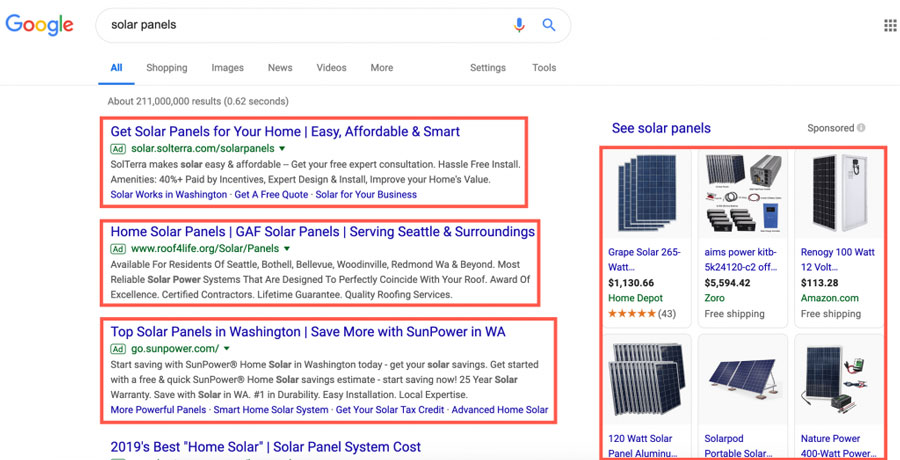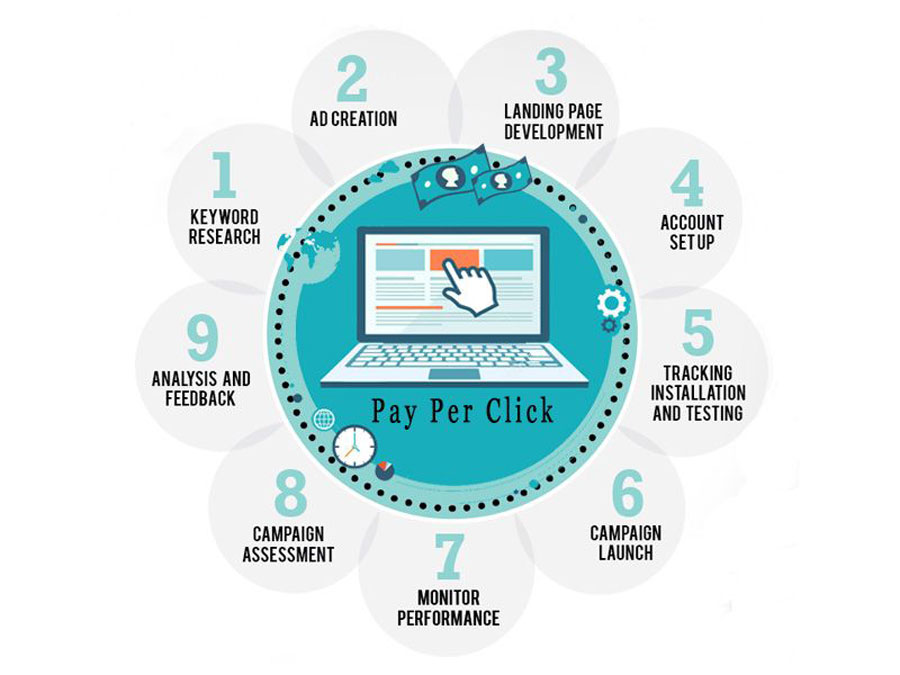Why PPC (search) advertising?
While PPC has become increasingly sophisticated over the years, there remain two basic reasons companies of every size spend billions of dollars every year on search advertising:
1. The ability to target ads based on the commercial intent that users signal with their search queries
2. Measurability
With tracking, advertisers can see the results of their campaigns in near real-time and adjust accordingly. There are many different targeting methods available in search advertising. Keyword targeting remains the foundation of search advertising: Advertisers bid on keywords that people are likely to use when searching for their product or service. For example, an accountant in Toronto might buy keywords such as "Toronto accountant," "accounting firm" or "tax accountant." Audience targeting, however, has become an increasingly prevalent way for search advertisers to target their ads. Advertisers can further refine the targeting by layering location and/or device specifications.

How Paid Search Works
Every time there is an ad spot on a search engine results page (SERP), an instantaneous auction takes place for the keyword.
A combination of multiple factors, including bid amount and the quality of the ad, decide the winner who will appear in the top spot of the SERP.
These auctions are what keeps the gears of PPC moving.
Auctions begin when someone searches for something on a search engine; if there are advertisers interested in showing ads related to a user's search query, an auction is triggered based on keywords that are bid on by advertisers. The ads that win the auction then appear on the search engine results page.
Accounts are split into campaigns for ease of management and reporting of different locations, product types, or other useful categorization.
Campaigns are further divided into ad groups that contain keywords and relevant ads.
Keywords:
Keywords are located at the center of PPC, connecting advertisers to users' search queries.
• Queries are the actual words that users type into the search box of a search engine in order to find results.
• Keywords, on the other hand, are what marketers use to target these users by matching their search queries.
Keywords work as generalized abstractions of a wide range of search queries, which are prone to irregularities like misspellings.
Depending on the keyword match types they use, advertisers can match search queries with more or less precision.
It is also possible to have negative keywords, which will prevent ads from being triggered by search queries containing those keywords, in order to avoid irrelevant traffic.
Ads:
These are nestled together within ad groups that target shared sets of keywords, and so are organized by common themes.
Ads are what the users will see if the auction is won, so they're very important to get right. They typically contain a:
• Headline.
• URL.
• Description.
Budgets & Bids:
In order to participate in the auction, advertisers need to decide how much they’re willing to spend on a given keyword. This is done using:
• Budgets at the campaign level.
• Bids at the ad group or keyword level.
Budgets are set at the campaign level and can be exceeded on a daily basis, but will not be overspent on a monthly basis. Budgets should be set according to overall account strategy, but bids are a more precise way of controlling spending.
All ad groups must have bids, but keyword level bids override ad group level bids.
Ad Rank
There’s more to winning the auction than having the highest bid.
Search engines look at other factors to determine which ads should be at the top and most valuable spot on the SERP.
Search engines have their own particular ways of factoring in other elements to determine ad rank. Google, for example, considers:
• Bid amount.
• Ad relevance and quality.
• The context of the search (such as the user’s device and time of day).
• Format impact (whether it includes extensions that enhance the format of the ad).
Quality Score is a metric that determines ad relevance. The components of Quality Score are:
• Historical click-through rate (CTR).
• Relevance of the keyword to the ad.
• Relevance of the keyword and ad to the search query.
• Landing page quality.
Ad relevance is absolutely essential; the higher Quality Score is, the lower the CPC will be.
But landing page quality shouldn't be overlooked either; ads will show less often when they point to sites with poor user experience.
The webpage must be relevant to the user, load quickly, and provide an overall smooth user experience on all devices.
The website designed should be user-friendly so that the visitor can explore the site with ease. We at High Ranker SEO focuses on developing the Website which is user-friendly so that the potential customers can navigate through the website hassle-free.
Targeting
Choosing the right keywords is what allows advertisers to show ads to relevant audiences.
But there are other targeting options available to optimize campaigns, including:
• Device.
• Location.
• Day and time.
• Demographics.
This way, advertisers can target users who are on mobile in the evening or users who are under 25 and within a certain radius of a particular location, in order to optimize the performance of their ads.

Conversions
The point of all this hard work isn’t to just get clicks.
The real end game is to obtain conversions.
Conversions are the actions that advertisers want users to complete after clicking on an ad, and depend on the type of business being advertised.
Common examples of conversions include:
• Purchasing a service.
• Signing up for a newsletter.
• Placing a phone call.
It's super important to track conversions in order to know whether a PPC campaign is doing well and how many conversions can be attributed to paid search rather than other marketing channels.
They often include multiple searches and website visits or can lead to an email, phone call, or in-store visit. Using an analytics service like Google Analytics can help to decide how credit for conversions is assigned in conversion paths.
Our PPC Experts at High Ranker SEO have a cumulative experience of more than 35 years in building winning campaigns from scratch.

